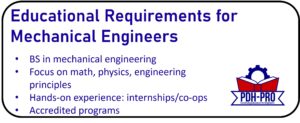Introduction: How to Become a Mechanical Engineer
Mechanical engineering is at the heart of innovation, shaping the world through design and problem-solving. From creating the engines that power our cars to developing cutting-edge technologies in renewable energy, mechanical engineers play a pivotal role in shaping modern life. For those passionate about turning ideas into reality, this career offers immense rewards—both intellectually and professionally.
Whether you’re a student considering mechanical engineering or a professional looking to advance, this guide will walk you through the steps, from education to licensing, and provide insights into the skills and opportunities this dynamic field offers.
Related Articles:
What Does It Take to Become an Electrical Engineer
What Does It Take to Become a Petroleum Engineer
What Do Mechanical Engineers Do?
Mechanical engineers are the innovators behind a vast range of systems and devices that power our everyday lives. They design, build, and improve everything from engines and generators to air conditioning systems and robotics. Their work often begins with analyzing a problem and developing solutions through prototype design and testing.
Mechanical engineers also play a key role in industries such as automotive, manufacturing, and renewable energy. As problem solvers, they help advance society’s infrastructure. In fact, engineering itself is fundamental to society’s progress, as explored in this article on the importance of engineering in our daily lives. Their expertise ensures that machines run efficiently, integrating mechanical, electrical, and thermal elements into cohesive systems that we depend on.
Educational Requirements for Mechanical Engineers
To become a mechanical engineer, a bachelor’s degree in mechanical engineering or mechanical engineering technology is essential. Accredited programs cover fundamental topics like mathematics, physics, and engineering principles, alongside specialized courses in thermodynamics, fluid mechanics, and machine design. Many programs offer hands-on experience through internships or cooperative education programs, giving students practical insights into the field.
Additionally, to become licensed, many engineers complete the Fundamentals of Engineering (FE) exam, which is often followed by the Professional Engineer (PE) exam after gaining work experience.
How to Become a Licensed Professional Mechanical Engineer
Becoming a licensed Professional Engineer (PE) is a significant milestone for mechanical engineers, especially those looking to advance their careers or take on leadership roles. The process begins with earning a bachelor’s degree from an ABET-accredited program. After graduation, aspiring engineers must pass the Fundamentals of Engineering (FE) exam, which certifies them as an Engineer-in-Training (EIT) or Engineer Intern (EI).
Once you’ve gained a minimum of four years of supervised work experience, you’re eligible to take the PE exam. This rigorous test evaluates your competence and ability to practice mechanical engineering at a professional level. Upon passing, you’ll receive your PE license, allowing you to legally offer engineering services to the public, take on more responsibility in your projects, and open doors to new career opportunities.
Licensure isn’t just about following regulations—it’s a mark of distinction that showcases your expertise and commitment to the field. It also ensures you meet the ethical and technical standards necessary for protecting public safety, which is at the core of every engineering discipline.
Mechanical Engineer Salaries and Earning Potential
Mechanical engineering offers a strong earning potential, with salaries varying based on factors such as industry, location, and level of experience. According to recent data, the median annual wage for mechanical engineers in the U.S. is around $99,500. Entry-level positions typically offer competitive starting salaries, and as engineers gain experience, especially with a Professional Engineer (PE) license, their earning potential significantly increases. Those working in specialized sectors, such as oil and gas or advanced manufacturing, often earn higher-than-average wages.
With opportunities to work across diverse industries, mechanical engineers enjoy robust career growth, and further education or certifications can open the door to even higher earning potential.
The following table provides a breakdown of salary information for mechanical engineers based on recent data:
| Industry | Average Annual Salary |
| Overall U.S. Average | $105,426 |
| Motor Vehicles & Equipment Manufacturing | $96,420 |
| Architectural & Engineering Services | $102,290 |
| Oil and Gas Extraction | $158,000 |
| Internet Publishing & Web Search Portals | $247,240 |
| Highest-Paying State (Alaska) | $147,363 |
| California | $126,972 |
| District of Columbia | $125,555 |
These figures show significant earning potential, especially for those working in specialized industries such as oil and gas or cutting-edge technology fields. The highest salaries are found in states like Alaska and California, reflecting the demand and cost of living in these regions.
Continuing Education Opportunities for Mechanical Engineers
As a professional mechanical engineer, staying up-to-date with the latest industry standards, technologies, and best practices is essential. Whether you’re looking to maintain your PE license or simply enhance your skills, our comprehensive suite of continuing education courses is designed to meet your needs. We offer over 40 courses tailored specifically for mechanical engineers, ranging from live webinars led by industry experts to self-directed courses that allow you to learn at your own pace.
Our course offerings include topics such as advanced thermodynamics, HVAC system design, renewable energy, and cutting-edge innovations in mechanical systems. These courses not only provide valuable professional development hours (PDH) but also keep you informed about the latest trends and regulations in mechanical engineering.
With options for live interaction through webinars, convenient recorded sessions, and flexible self-directed learning, there’s a course format to fit every schedule. Whether you’re a seasoned engineer or just starting your career, these courses will help you stay ahead in this ever-evolving field. Explore our catalog to find the course that best suits your professional development needs.
Career Path and Advancement Opportunities
Mechanical engineers enjoy a wide range of career paths and advancement opportunities. Early in your career, you may start as an entry-level engineer, working on design, testing, or production. Over time, with experience and continued education, you can take on more responsibilities, leading to roles such as project manager, team leader, or department head. A Professional Engineer (PE) license is a critical milestone for career advancement, enabling you to oversee public projects, sign off on designs, and lead engineering teams.
For those interested in more specialized fields, additional certifications in areas like HVAC systems, automotive design, or robotics can further enhance career prospects. Mechanical engineers can also transition into senior roles such as engineering directors, consultants, or technical experts in niche industries.
Further education, such as a master’s degree or MBA, can lead to executive positions, including Chief Engineer or even roles in management, blending engineering expertise with business acumen. Mechanical engineers who remain engaged in ongoing learning and adapt to emerging technologies, like renewable energy or automation, will find numerous opportunities to grow throughout their careers.
Conclusion
Becoming a mechanical engineer is a rewarding journey filled with opportunities for growth, innovation, and professional advancement. With a solid educational foundation, key technical and analytical skills, and the pursuit of licensure, mechanical engineers can make a significant impact across various industries. Whether you’re designing cutting-edge technologies or leading engineering teams, the field offers diverse career paths that can lead to leadership roles or specialization in advanced sectors. Continuous learning and adaptability are key to long-term success in this ever-evolving profession.
Contributor: Jordan Ellis
